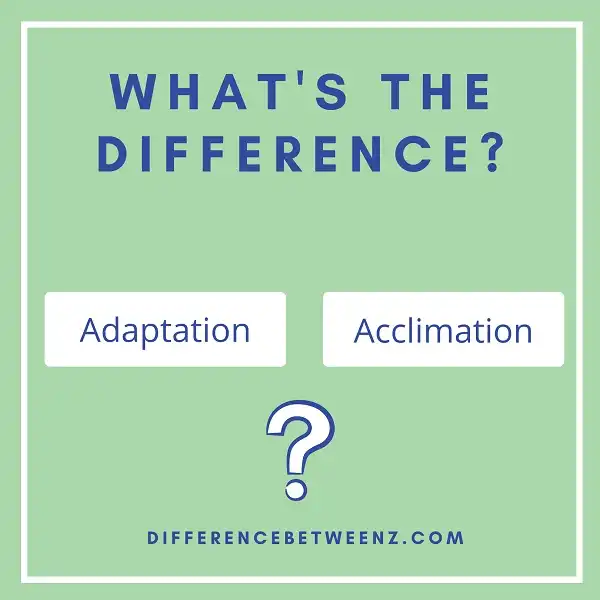There is a lot of confusion about the difference between adaptation and acclimation. In fact, many people use the words interchangeably. However, there is a distinct difference between the two processes. This blog post will help to clear up the confusion and explain the differences between adaptation and acclimation.
What is Adaptation?
Adaptation is a process whereby a species becomes better suited to its environment. This can happen in a number of ways, but most often it occurs through the process of natural selection. Under this process, those individuals who are better adapted to their environment are more likely to survive and reproduce, while those who are less adapted are more likely to perish. Over time, this can lead to significant changes in the makeup of a species, as individuals with certain traits become more common. Adaptation is one of the most important mechanisms driving evolution, and it plays a vital role in shaping the natural world.
What is Acclimation?
Acclimation is the process of adjusting to a new environment or condition. It is a gradual process that helps the body adapt to changes in temperature, humidity, atmospheric pressure, and other conditions. The Acclimation Process helps the body adjust more easily to these changes and reduces the risk of illness or injury. Acclimation typically occurs over a period of days or weeks, and the body usually adapts without any problems. However, in some cases, the Acclimation Process can take longer, and people may experience symptoms such as headaches, fatigue, and nausea.
If these symptoms persist for more than a few days, it is important to see a doctor to rule out any potential health problems. Acclimation is an important process that helps the body adjust to new environments or conditions. By understanding Acclimation, people can reduce the risk of illness or injury and make the transition to new surroundings more smoothly.
Difference between Adaptation and Acclimation
Adaptation and acclimation are two processes that help organisms to cope with changes in their environment. Adaptation is a long-term process that results in permanent changes to an organism, such as the development of new physical features or changes in behavior. In contrast, acclimation is a short-term process that allows an organism to temporarily adjust to new environmental conditions, such as changes in temperature or humidity. While adaptation requires genetic change, acclimation does not. Instead, it relies on the plasticity of an organism’s physiology, which allows it to make rapid adjustments in response to changing conditions.
While both adaptation and acclimation are important mechanisms for coping with environmental change, they differ in several key ways. Adaptation is a long-term process that leads to permanent changes in an organism, while acclimation is a short-term process that results in temporary changes. Adaptation requires genetic change, while acclimation does not. And finally, adaptation allows an organism to cope with new environmental conditions, while acclimation allows an organism to cope with changes in existing environmental conditions.
Conclusion
The human body is an amazing machine that can adapt to a variety of different environments, but there is a difference between adaptation and acclimation. Understanding the difference can help you make better choices about where to live or work, and how to prepare your body for changes in climate.


